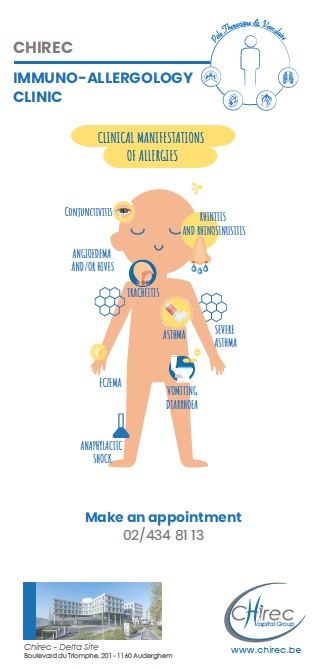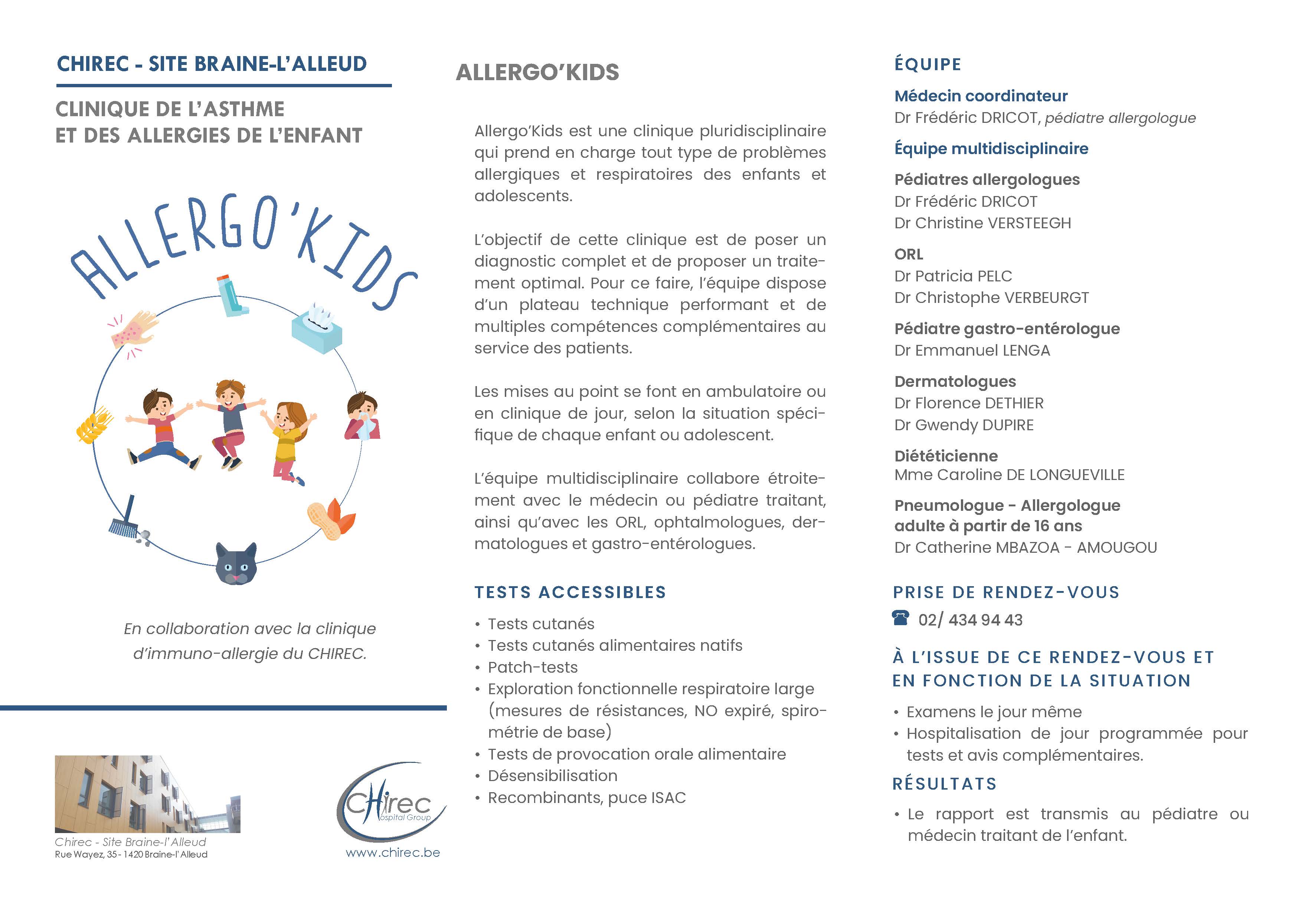The multidisciplinary centres
 Immuno-allergology clinic
Immuno-allergology clinic
Presentation
According to the WHO, allergies are the 4th most common chronic disease in the world.
Whether respiratory, drug, skin, or even food allergies, there are many of them and they are constantly increasing.
Delta Hospital therefore decided to set up a multidisciplinary immuno-allergology clinic with the collaboration of other sites of Chirec.
Multidisciplinarity is a major advantage because it allows the patient to receive overall care, whatever the organ(s) involved, both in adults and children.
Our specialists and paramedics
-

ARS Catherine
Pulmonary Medicine, Sleep ...
See file -

CHAOUAT Philippe
Paediatrics
See file -

COGAN Elie
Internal medicine
See file -

COLLARD Alexandra
Nutritional medicine
See file -

DE COCK DE RAMEYEN Delphine
Ear, Nose & Throat
See file -

DE KOSTER Jacques
Pulmonary Medicine
See file -

DE THIER Florence
Dermatology
See file -

DRICOT Frederic
Paediatrics
See file -

DUPIRE Gwendy
Dermatology
See file -

HUPIN Cloé
Ear, Nose & Throat
See file -

LANGLET Philippe
Gastroenterology
See file -

LIPSKI Samuel
Ear, Nose & Throat
See file -

MARGAUX Joelle
Rheumatology
See file -

MBAZOA AMOUGOU Catherine
Internal medicine, Pulmonary ...
See file -

MICHEL Olivier
Pulmonary Medicine
See file
What do we do?
We perform different types of allergic disease assessments:
- Respiratory allergology
- Food allergology and management
- Food intolerances: lactose, celiac and non-celiac hypersensitivity to gluten, intolerance to FODMAP
- Simple or complicated rhinosinusitis
- Dermatological allergies: contact and skin allergies
- Hymenoptera venoms (bee, wasp, horsefly, etc.)
We test for allergies in the context of asthma, rhinitis, conjunctivitis, and food, drug and skin (contact) allergies by means of:
- Allergy skin tests
- Intradermal reaction (drugs; bee, wasp, horsefly venom, etc.)
- Patch tests
- Oral and subcutaneous (food and drug) challenge tests
- Nonspecific conjunctival, nasal, bronchial challenge tests
- Oesophageal biopsy (examination for eosinophilic oesophagitis)
- Specific laboratory tests (immuno-CAP, CAP-ISAAC, baso-test)
Therapeutic approach
- Elimination
- Symptomatic treatment
- Curative treatment with specific immunotherapy for specific allergens (oral and subcutaneous desensitisation)
- Management of severe asthma with the use of biotherapies
- Treatment of chronic urticaria and angioedema with the use of new drugs
- Treatment of severe and chronic sinusitis belonging to a specific syndrome or not
- Treatment of atopic eczema with the use of new drugs
- Management of auto-immune diseases and immunodeficiencies (biotherapy, gamma-globulin, etc.)
- Adherence, evaluation of usefulness, possible adverse effects and comfort of drug treatments
Immuno-allergy assessment in 3 steps
1. During the initial consultation, we carry out a detailed medical history, past and current, followed in certain cases by allergy skin tests, measurement of lung function and blood tests.
We offer initial treatment and sometimes schedule complementary examinations (ENT, X-ray imaging, gastrointestinal endoscopy, more detailed allergy tests).
2. During the second consultation, we put together all the information and adjust treatment from a multidisciplinary perspective.
3. During the third consultation, we check the effectiveness of the treatment, taking into account any side effects.
Treatments for chronic conditions (pharmacological and biological) as well as avoidance measures and checking adherence to treatment are then pursued in close cooperation with the referring doctor and/or primary care doctor.
More detailed allgery tests
1. Skin tests for native foods
2. Reintroduction of feeding by mouth (called 'challenge test'*)
3. ID for medicines*
4. Reintroduction (by mouth or by injection) of a drug (referred to as 'challenge test'*)
5. ID for hymenoptera venoms (bees, wasps)
6. Non-specific bronchial challenge tests (histamine or effort)
7. Specific laboratory tests (immuno-CAP, CAP-ISAAC, baso-test)
* one-day hospitalisation
Therapeutic approaches
1. Avoidance (= eliminating the cause(s), for example food, with a nutritionist's intervention)
2. Adherence to the treatment (= checking it is being used correctly) with the intervention of a specialist nurse
3. Evaluating usefulness, potential adverse effects and comfort of drug treatment
4. In some cases, planning ahead for specific oral or subcutaneous immunotherapy (= desensitisation)
5. Planning ahead, in certain situations, for new biotherapies.

